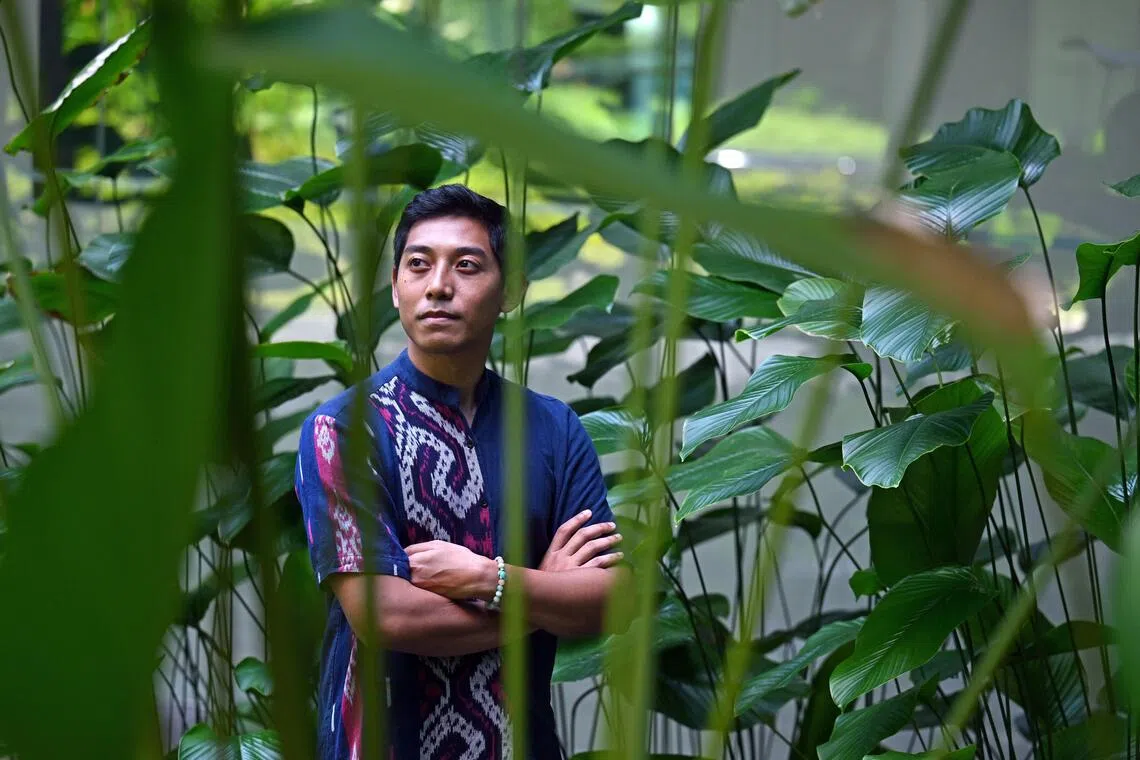From local to global stage: How one young man’s focus on sustainability led him to COP30
Sign up now: Get ST's newsletters delivered to your inbox

Mr Safafisalam Bohari Jaon, 29, will lead a team of five youth in Singapore’s delegation for the first week of COP30 in Belem, Brazil.
ST PHOTO: DESMOND FOO
Follow topic:
- Safafisalam Bohari Jaon left insurance to address climate change impacts, especially within Singapore's Malay/Muslim community vulnerable to rising heat.
- As a youth leader at COP30 in Brazil, he aims to guide youth to gather best practices and narratives that will help Singaporeans.
- Singapore is sending a smaller delegation to COP30 due to accommodation and logistics constraints.
AI generated
SINGAPORE – In August 2022, Mr Safafisalam Bohari Jaon quit his job in the insurance industry amid the Covid-19 pandemic, with just a dream to help communities vulnerable to the impacts of climate change.
Then 26, he had been inspired by one of the projects he worked on to raise health literacy among Vietnamese women to find a career that goes beyond the “typical profit-making kind of metrics”.
“Unfortunately, my community – the Malay/Muslim community – is disproportionately impacted by climate change,” said Mr Safafisalam, who is now an economics and social impact consultant.
“When you talk about rising heat levels, they particularly affect those living in rental flats and delivery riders, quite a number of whom are Malay/Muslim.”
He managed to land a strategy consultant role by December that year, and three years later, the 29-year-old is taking his aspirations to new heights as he leads a group of youth delegates from Singapore during the first week of the UN climate meeting held in Belem, Brazil, the gateway to the Amazon jungle – the world’s biggest tropical rainforest.
Diplomats, companies and activists from nearly 200 countries are expected to attend the 30th annual meeting of the Conference of the Parties to the United Nations Framework Convention on Climate Change, more commonly known as COP30.
Outside the negotiation rooms, Mr Safafisalam sees an important role for the youth at the COP30 pavilions, where countries, organisations and interest groups host their own events during the conference, slated to run from Nov 10 to 21. Singapore’s team of 12 comprises university students and working professionals passionate about climate action.
“There’s definitely the expectation that they will bring back the best practices, whether it’s technology or how people are solving problems; but also narratives, which perhaps they wouldn’t have known of before going to COP30,” he said.
“As they get more cognisant about these issues, they could realise that there are real things that everyday Singaporeans can work towards beyond relying on the Government to negotiate for carbon markets, implementation agreements and other financial instruments.”
The engineering systems and design graduate’s own experience as part of the inaugural cohort of the Government’s youth delegates
At a time when the COP30 process has come under fire for its high costs and accommodation issues
Addressing the scepticism labelling such meetings as “all talk, no action”, he believes that COP goes beyond international decisions undertaken. Its value lies in bringing countries together, through the negotiations, mixers and other events, which can lead to bilateral partnerships.
Still, the accommodation and logistics constraints have meant some scaling back. The Singapore Government will be sending a smaller delegation to Belem in 2025.
A Ministry of Sustainability and the Environment spokeswoman said that a total of 10 young people from the current Climate Youth Development Programme cohort will take part, compared with the usual 20. They will be led by Mr Safafisalam in the first week, and science teacher-turned-content creator Kong Man Jing in the second week.
The spokeswoman said the ministry opted to continue sending youth delegates to COP because the experience offers an invaluable platform to deepen their understanding of international climate issues, build networks with like-minded peers globally, and strengthen their leadership potential in advancing sustainability.
“Apart from participating in some of the meetings, events at the Singapore Pavilion and interacting with youth from other countries, our youth will also have an opportunity to interact with local communities in Brazil to learn first-hand about the impacts of climate change,” she added.
Mr Safafisalam will closely monitor discussions on climate finance, which is high on the agenda for COP30. Participants are expected to deliberate on strategies to raise the current commitment of US$300 billion (S$390 billion) for climate action in developing countries to a target of US$1.3 trillion.
Of interest, for him, is how funding can be raised through a pay-for-success model, which Brazil is mooting in the form of the Tropical Forests Forever Facility
He said: “Considering this from a political level, if capital flows can represent what people truly value, and we can get people to value equity, justice and distribution, then I think that can be a very powerful tool – shifting away from seeing money as inherently evil.”
On a personal level, Mr Safafisalam sees sustainability as an existential issue for the planet.
He said: “At the end of the day, I feel a connection with people who are affected by climate change and all these inequity issues that resonate with me, rather than (issues about) plants and animals.
“I think when we frame it like that – how the planet sustains all of us and recognise that some are affected by climate change more than others – and reflecting on our inherent sense of justice, a more natural connection emerges.”


